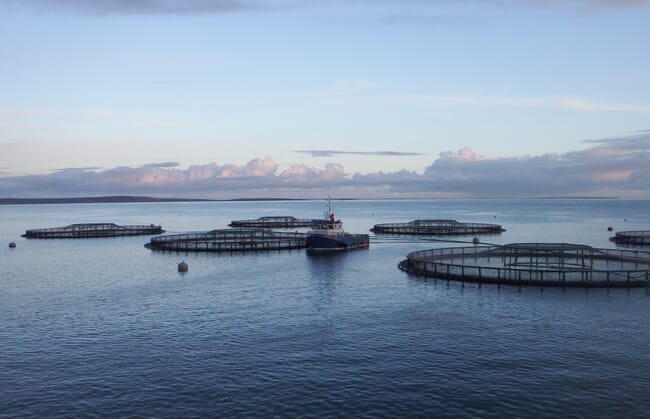The news, announced today, was welcomed by Scotland’s Minister for the Rural Economy and Connectivity, Fergus Ewing MSP.
The figures reveal that Scottish Sea Farms, which operates 46 farm sites, two processing plants and employs 449 people, spent over £100m – 85% of total supplier spend – procuring goods and services from local businesses in 2017, many of them small to medium-sized enterprises (SMEs).
This is up £13.9m on 2016 and is driven by a long-standing company policy to buy Scottish wherever possible.
Jim Gallagher, managing director of Scottish Sea Farms, explains: “The communities in which we farm are integral to our success, from their natural resources to their local workforces and businesses. It seems only fitting therefore that these same communities should derive maximum value in return; something we are proud to have grown again in 2017 – and will strive to continue growing in 2018 and beyond.”
The figures also show that Scottish Sea Farms:
- Procured goods and services from 709 local suppliers across Scotland.
- Invested most on feed, nutrition and ensuring optimum fish health, followed by construction of an innovative new freshwater facility at Barcaldine, near Oban.
- Achieved an average spend of £141,474 per Scottish-based supplier.
The news comes on the back of the recent Scottish Salmon Farming Economic Report, commissioned by the Scottish Salmon Producer’s Organisation, which highlighted that the sector contributes £558m to the national economy in GVA and spends a total of £390m on local suppliers and services.
Fergus Ewing commented: “These figures show the scale of the support that Scottish aquaculture provides for rural businesses, protecting and creating jobs, and supporting communities. The support they offer for research and innovation is also invaluable in ensuring the long-term future of the industry.”

© Fusion Marine
One such local supplier is Gael Force, headquartered in Inverness, which saw an increase in turnover of close to 45 percent in 2017 and added 50 new jobs.
Stewart Graham, managing director, said: “Almost all of this growth can be attributed to orders from the aquaculture industry. It’s the ongoing support of companies such as Scottish Sea Farms that has propelled us on to develop new innovative technologies and services – something we will continue to do in 2018 with a planned £1 million investment in increased capacity and the development of new products.”
It’s not just companies located in the aquaculture heartland of the Highlands and Islands that are feeling the benefit of Scottish Sea Farms’ procurement policy.
Jim Traynor, chairman of net manufacturers W&J Knox in Ayrshire, says: “Few people would connect Ayrshire with aquaculture, yet the positive impact of the industry is keenly felt, with Scottish Sea Farms’ contracts helping protect 63 jobs in an area of otherwise high unemployment – not forgetting the onward spend within the local community.”
Iain Forbes, Director of Fusion Marine, near Oban, which recently received a £1m order from Scottish Sea Farms for new fish farm pens, adds: “Hauliers, B&Bs, ferry travel, generators, welfare units and sundries – each and every pen we install for Scottish Sea Farms generates business both for the area local to us and the remote communities in which we work. Often, this is for months at a time during winter when revenue from tourism is traditionally lower.”


